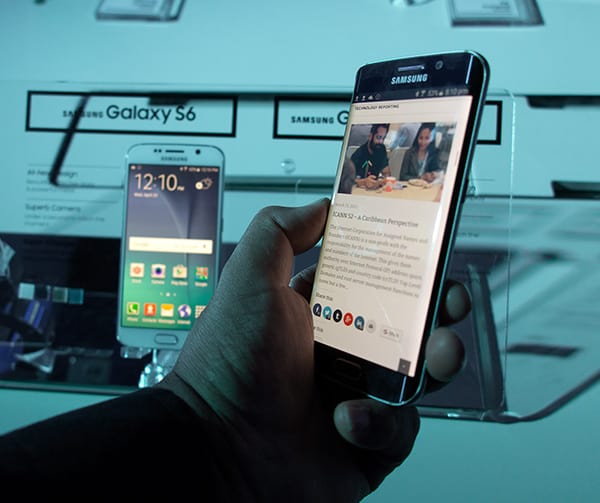
BitDepth#986 for April 28, 2015

The Samsung S6 edge shows its style from the side at last week’s launch of the new smartphones. At left is the S6.
Photo by Mark Lyndersay.
Like a particularly fine needle seeking its groove, Samsung introduced the new flagship models of its smartphone line at Home a week ago, the design and art collaborative space incorporated into the family home of the fashion forward Anya Ayoung-Chee.
The event, appropriately chic and accented with cool blue lighting, attracted an even mix of media, smartphone divas and industry professionals with an eye on the response to the new devices.
They need not have worried.
The phones, officially launched last Friday, are available for anyone to fondle in the stores of both bMobile and Digicel as well as Samsung’s local Experience Stores, and they are going to move quickly among those who want the latest and greatest in Android smartphone technology.
For those who want all the details on the new devices, this column’s reporting on the new S6 series is here.
There’s nothing like actually holding the device though, and while the specifications of the S6 and S6 edge are similar, there are some crucial differences that shoppers might want to look out for.
The most immediate difference is in the relative weight of the devices.
Both are lighter than the S5 (142g). The S6 weighs in at 138 grams while the S6 edge tips the scales at 132g.
The difference is tiny on paper, but significant in practical use.
I hefted both phones one after the other and was shocked at the surprising airiness of the S6 edge.
Add to that the curvy edge on that model and you have an alluring little smartphone package that acquits itself well among competition equally determined to offer a phone that’s also an accessory.
After holding both, it’s clear there’s really no competition. The S6 edge is absolutely the phone to own.
Of course, being fashionable isn’t the only reason to shell out thousands of dollars to own a new smartphone, though it might be for some well-heeled and amply funded folks.
Snappers making use of a smartphone to capture images in challenging circumstances will be pleased to find that the S6 series is significantly more capable in low-light settings.
Samsung has improved the S5’s maximum aperture of f2.2 to f1.9 for the rear leans and f2.4 to f1.9 for the front-facing lens.
It might not seem like a big change, but professional photographers are well aware that crossing f2 on any lens, even a tiny one, requires significant engineering.
That’s resulted in a lens housing that protrudes like a giant zit from the otherwise sleek rear face of the device, but it’s an issue that’s likely to be quickly addressed by a good camera case – and who doesn’t put a camera costing that much into one?
Photographers making use of their smartphone as a serious camera will be pleased to find that Samsung has also introduced Optical Image Stabilisation, further improving low-light image quality and a Pro mode for the camera software, which finally allows shooters to manually adjust the capture settings to taste.
Improved photography isn’t the only reason to consider the new S6 series, but it’s one of those across-the-board improvements that’s going to impress everyone.
Another is the leaner, TouchWiz interface for the device, which is noticeably faster and less clotted with useless, unremoveable apps.
Samsung has wisely chosen to allow users to choose their own free tools and games from its app store and shipped the S6 with core software.
Even the surprising retention of USB2 as a connection and charging port has been driven by a new feature, wireless charging that works with most common charge plates.
According to Kenneth Moore, Key Accounts Manger for Samsung, the company is open to expanding its programme to supply such charge points with local companies and is also actively seeking more B2B contracts, with its security platform, Knox, as a key differentiator.
The new S series, according to Moore, have “exceeded expectations for sale since their introduction.”
They look set to do well in T&T as well.

